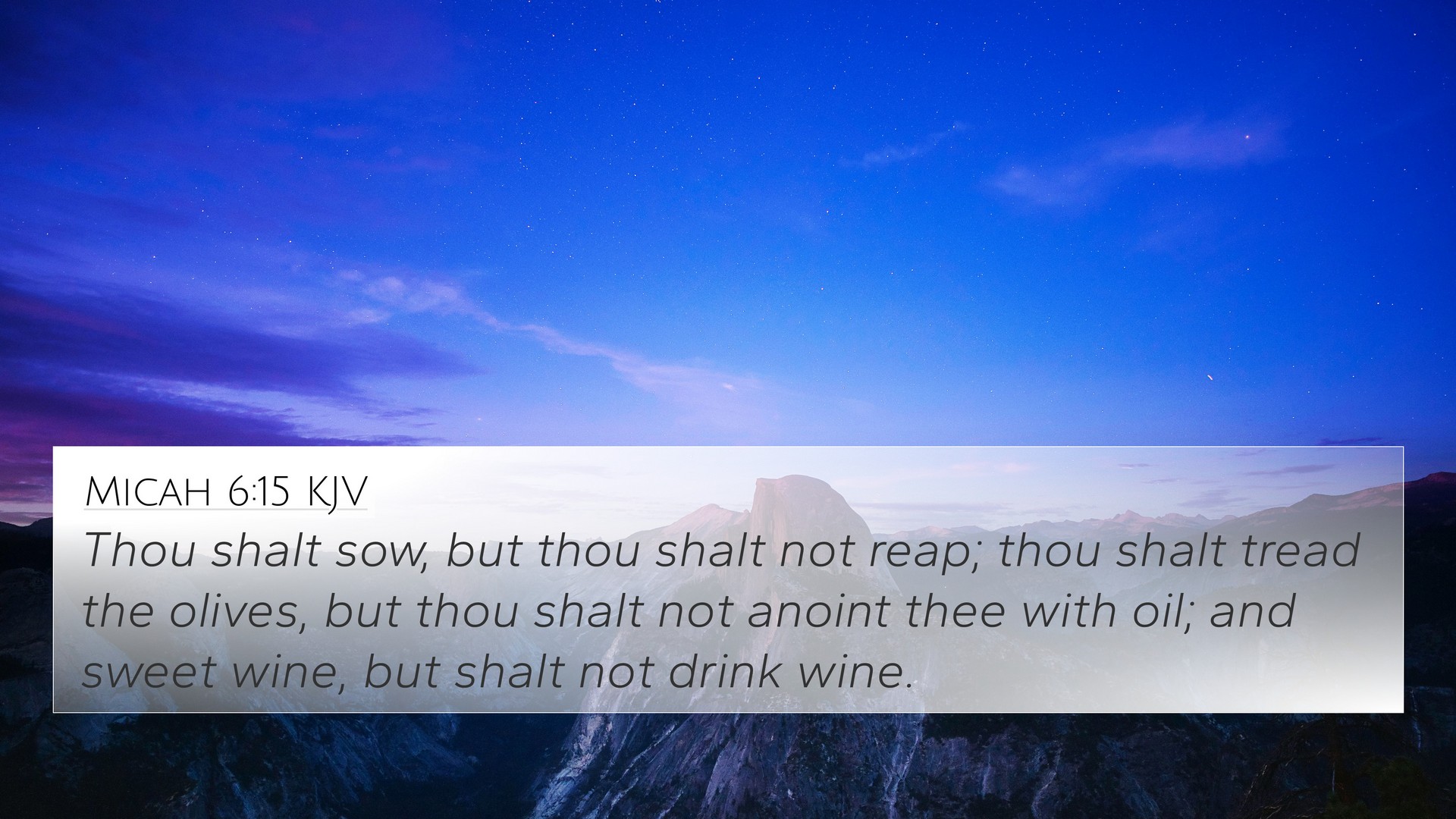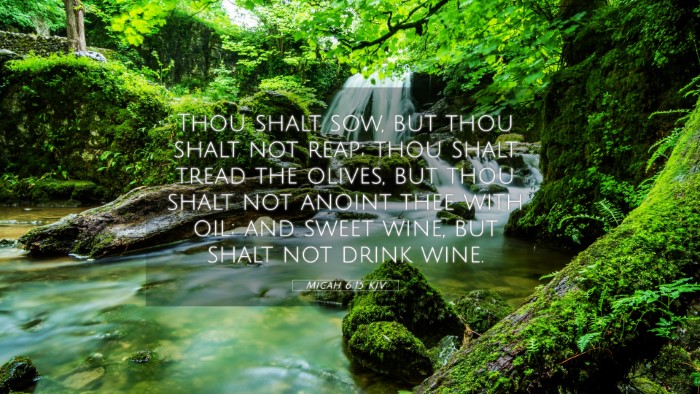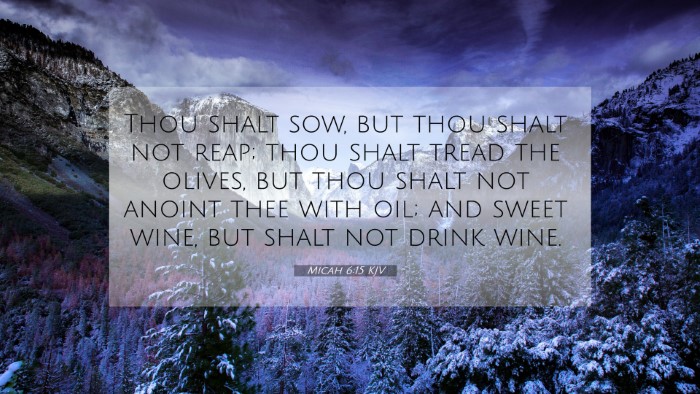Old Testament
Genesis Exodus Leviticus Numbers Deuteronomy Joshua Judges Ruth 1 Samuel 2 Samuel 1 Kings 2 Kings 1 Chronicles 2 Chronicles Ezra Nehemiah Esther Job Psalms Proverbs Ecclesiastes Song of Solomon Isaiah Jeremiah Lamentations Ezekiel Daniel Hosea Joel Amos Obadiah Jonah Micah Nahum Habakkuk Zephaniah Haggai Zechariah MalachiMicah 6:15 Similar Verses
Micah 6:15 Cross References
Thou shalt sow, but thou shalt not reap; thou shalt tread the olives, but thou shalt not anoint thee with oil; and sweet wine, but shalt not drink wine.
Uncover the Rich Themes and Topics of This Bible Verse
Listed below are the Bible themes associated with Micah 6:15. We invite you to explore each theme to gain deeper insights into the Scriptures.
Micah 6:15 Cross Reference Verses
This section features a detailed cross-reference designed to enrich your understanding of the Scriptures. Below, you will find carefully selected verses that echo the themes and teachings related to Micah 6:15 KJV. Click on any image to explore detailed analyses of related Bible verses and uncover deeper theological insights.
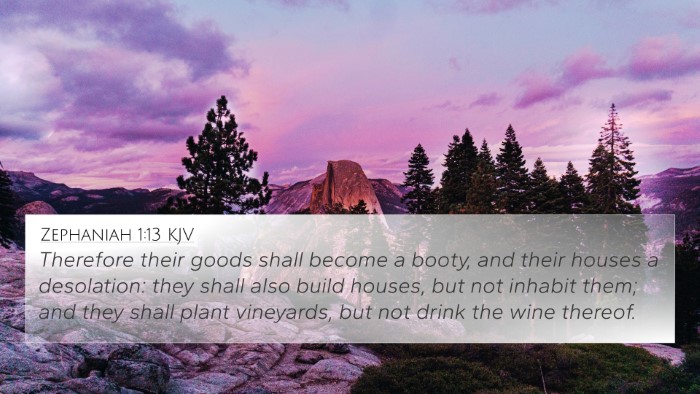
Zephaniah 1:13 (KJV) »
Therefore their goods shall become a booty, and their houses a desolation: they shall also build houses, but not inhabit them; and they shall plant vineyards, but not drink the wine thereof.
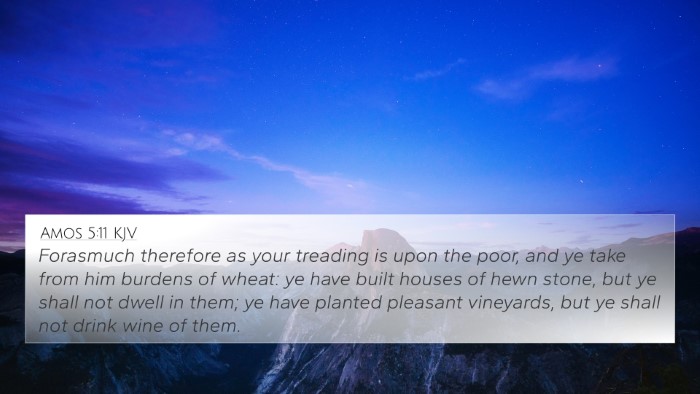
Amos 5:11 (KJV) »
Forasmuch therefore as your treading is upon the poor, and ye take from him burdens of wheat: ye have built houses of hewn stone, but ye shall not dwell in them; ye have planted pleasant vineyards, but ye shall not drink wine of them.
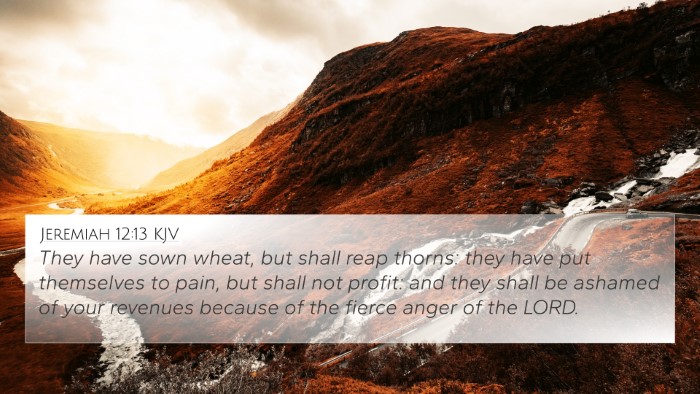
Jeremiah 12:13 (KJV) »
They have sown wheat, but shall reap thorns: they have put themselves to pain, but shall not profit: and they shall be ashamed of your revenues because of the fierce anger of the LORD.
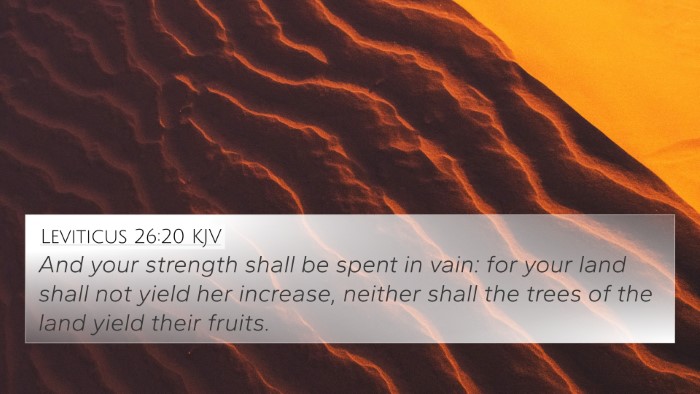
Leviticus 26:20 (KJV) »
And your strength shall be spent in vain: for your land shall not yield her increase, neither shall the trees of the land yield their fruits.
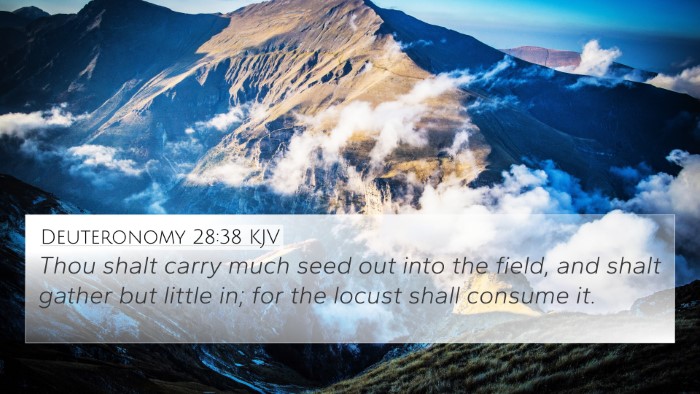
Deuteronomy 28:38 (KJV) »
Thou shalt carry much seed out into the field, and shalt gather but little in; for the locust shall consume it.
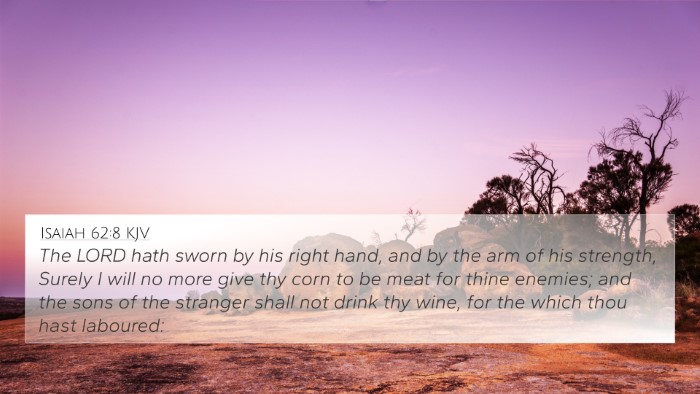
Isaiah 62:8 (KJV) »
The LORD hath sworn by his right hand, and by the arm of his strength, Surely I will no more give thy corn to be meat for thine enemies; and the sons of the stranger shall not drink thy wine, for the which thou hast laboured:
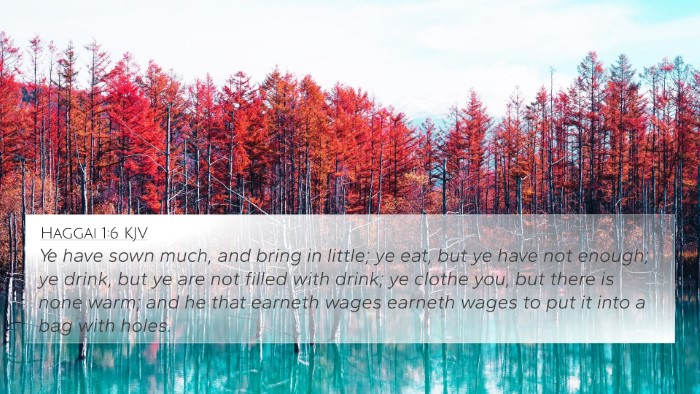
Haggai 1:6 (KJV) »
Ye have sown much, and bring in little; ye eat, but ye have not enough; ye drink, but ye are not filled with drink; ye clothe you, but there is none warm; and he that earneth wages earneth wages to put it into a bag with holes.
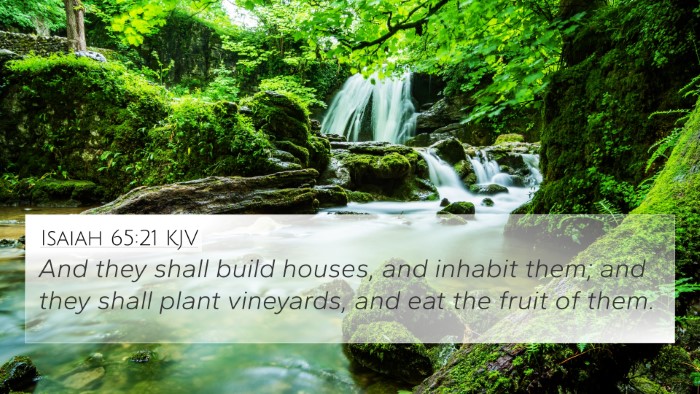
Isaiah 65:21 (KJV) »
And they shall build houses, and inhabit them; and they shall plant vineyards, and eat the fruit of them.
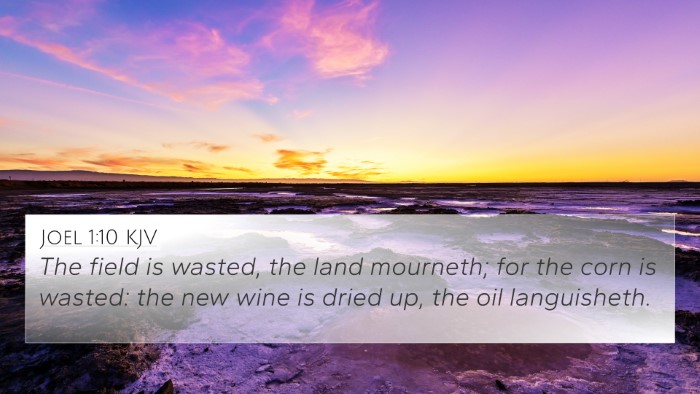
Joel 1:10 (KJV) »
The field is wasted, the land mourneth; for the corn is wasted: the new wine is dried up, the oil languisheth.
Micah 6:15 Verse Analysis and Similar Verses
Understanding Micah 6:15
Micah 6:15 states:
"Thou shalt sow, but thou shalt not reap; thou shalt tread the olives, but thou shalt not anoint thee with oil; and sweet wine, but shalt not drink wine."
This verse speaks to the theme of futility in laboring without a just reward. To fully grasp the meaning of this verse, it is vital to explore insights from prominent public domain commentaries.
Commentary Insights
Matthew Henry emphasizes the justice of God, highlighting how unrepentant people may labor fruitlessly as a divine consequence of their sins. He connects this verse to the broader theme of judgment upon a nation that has forsaken God. Henry notes that the imagery of sowing and not reaping signifies a disconnect between people's efforts and the blessings they receive, echoing God's displeasure and the consequences of moral failure.
Albert Barnes expounds that Micah's message includes a stark warning to those who engage in wrongful practices, such as cheating or injustices, which lead to a lack of fulfillment in their endeavors. Barnes correlates this to the agricultural society of Israel, where the promise of reaping was closely linked to righteousness and faithfulness. He notes how the lack of oil and wine symbolizes the cessation of spiritual and material blessings due to disobedience.
Adam Clarke elaborates on the agricultural metaphors used in this verse, expressing that the absence of reward (not reaping or enjoying the fruits of one’s labor) is a significant plight for the people. Clarke connects this with the larger narrative of Israel's covenant relationship with God, where disloyalty often results in a barren life, devoid of joy and fulfillment. His commentary conveys a dire warning about the inevitability of judgment and the loss of privileges and blessings when one deviates from God’s path.
Cross-References for Micah 6:15
This verse connects with various other scriptures that deepen its insights and message. Here are several pertinent cross-references:
- Deuteronomy 28:38-40 - Discusses curses for disobedience, including failing to reap what is sown.
- Hosea 8:7 - "For they have sown the wind, and they shall reap the whirlwind." A direct connection to the futility of wrong actions.
- Galatians 6:7 - "For whatsoever a man soweth, that shall he also reap." Reflects the principle of divine justice.
- Isaiah 5:10 - Describes how vineyard laborers shall not enjoy the fruits of their labor due to judgment upon the land.
- Jeremiah 12:13 - "They have sown wheat, but shall reap thorns." Another vivid illustration of anticipated fruitlessness due to rebellion.
- James 5:5 - "Ye have lived in pleasure on the earth, and been wanton; ye have nourished your hearts, as in a day of slaughter." Points to indulgence without repentance leading to desolation.
- Proverbs 10:3 - "The Lord will not suffer the soul of the righteous to famish: but he casteth away the substance of the wicked." Emphasizes reward based on righteousness.
- Amos 5:11 - Talks about how they will not enjoy what they labor for, connecting societal injustice to personal loss.
- Matthew 21:43 - "The kingdom of God shall be taken from you, and given to a nation bringing forth the fruits thereof." Reflection on the transfer of blessings based on faithfulness.
- Romans 2:6 - "Who will render to every man according to his deeds." Reinforcement of the theme of divine justice in relation to individual actions.
Conclusion
The analysis of Micah 6:15 reveals a profound warning about the consequences of turning away from God. The thematic connections found in this passage—as illustrated through cross-referenced scriptures—provide deeper insight into the nature of divine justice and the futility of unfaithful labor. The interpretations from Matthew Henry, Albert Barnes, and Adam Clarke all reinforce the importance of maintaining one's covenant with God to reap the benefits of spiritual and material blessings.
By engaging in a thorough Bible cross-reference study, believers can identify the interconnectedness of scripture and interpret the divine message woven throughout the Biblical text. Understanding how these verses relate to one another enables a richer and more comprehensive approach to scripture interpretation.
Tools for Further Study
- Utilizing a bible concordance to find related texts.
- Consulting a bible cross-reference guide for deeper insights.
- Employing cross-reference Bible study methods for thematic explorations.
- Accessing bible reference resources for comprehensive scriptural analysis.
- Exploring bible chain references to link themes throughout the scriptures.
